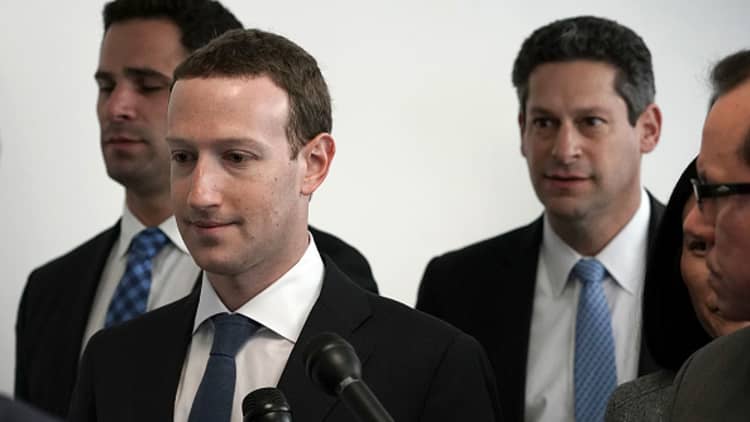
Former Facebook executive Mike Hoefflinger said the failure of Facebook and its CEO, Mark Zuckerberg, to protect user data "looks a bit like arrogance," but said it's more a matter of not anticipating what could have gone wrong.
"If you attract 1.4 billion people a day, some of them are not going to be great people," Hoefflinger said Tuesday on CNBC's "Power Lunch" before the start of Zuckerberg's testimony. "And some of the process of using that product is not going to be as joyful as perhaps it used to be. You need to increasingly swing and overcorrect for that overprotection, that vigilance, instead of that obsession with building and writing the next line of code."
The social media company has been the leaders in innovation, said Hoefflinger, but has not paid enough attention to safeguarding the brand.
"This is not a case of being willfully blind or being opportunistic or profiteering," said Hoefflinger, who spent seven years at Facebook as director of global business marketing, and has worked closely with both Zuckerberg and Facebook's chief operating officer, Sheryl Sandberg. "I think it is simply a matter of not anticipating enough."
Hoefflinger, who is now an advisor to companies like Pinterest and Sprinklr, said Facebook will have to focus on what's good for users, not businesses, in order to regain the public's trust.
"For the very simple reason that without people he doesn't have a mission and eventually a company," Hoefflinger said.
On Tuesday, Zuckerberg will testify in front of Congress regarding the Cambridge Analytica data scandal that affected approximately 87 million Facebook users.
Tuesday's Capitol Hill testimony will include 43 senators. Each will be given five minutes to question Facebook's chief executive officer during the four-hour session. Hoefflinger, who also wrote the book "Becoming Facebook: The 10 Challenges that Defined the Company That's Disrupting the World," expects Zuckerberg to be open and engaged.
"Q&A is his preferred format," Hoefflinger said.
Facebook has announced planned changes, including safeguarding the platform, limiting the information that developers can access and building better controls. In addition, Zuckerberg has said in the past that there are 15,000 people who work in security for Facebook, but that number will soon increase to 20,000 employees.
On Tuesday morning before Zuckerberg's testimony, Facebook also announced a data abuse bounty program, where the company will reward people who report any misuse of data by app developers. If Facebook finds abuse, it will shut down the offending apps and take legal action. There is no maximum reward for this program.
While lawmakers continue to ponder the need for increased regulation in the tech sector, Hoefflinger said this might not be the answer.
"The outcomes in consumer technology are not really controlled by regulation," he said. "Blockbuster, Yahoo and Nokia didn't fail because of regulation. Google, Apple and Facebook aren't succeeding because of it. I think there are market forces. Those market forces are controlled by us and which products we prefer and which products are meeting our expectations."
"You can never save yourself out of a downturn or a negative event like this," Hoefflinger said. "You always have to build yourself out of it."
"[Zuckerberg] is going to have to work himself out of the hole and then back beyond it," he said.


